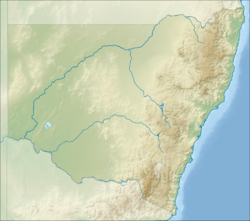The Kindra Creek, a watercourse[2] that is part of the Murrumbidgee catchment within the Murray–Darling basin, is located in the Riverina and South West Slopes regions of New South Wales, Australia.
| Kindra | |
|---|---|
Location of the Kindra Creek mouth in New South Wales | |
| Location | |
| Country | Australia |
| State | New South Wales |
| Region | Riverina (IBRA), South West Slopes |
| LGA | Coolamon |
| Physical characteristics | |
| Source | Great Dividing Range |
| • location | southwest of Temora |
| • coordinates | 34°39′54″S 147°28′17″E / 34.66500°S 147.47139°E |
| • elevation | 325 m (1,066 ft) |
| Mouth | confluence with the Mimosa Creek to form Redbank Creek |
• location | north of Ganmain |
• coordinates | 34°43′54″S 147°14′23″E / 34.73167°S 147.23972°E |
• elevation | 197 m (646 ft) |
| Length | 60 km (37 mi) |
| Basin features | |
| River system | Murrumbidgee catchment, Murray–Darling basin |
| [1] | |
Course and features
editThe Kindra Creek (technically a river[2]) rises near Warre Warral trigonometry station southwest of Temora, sourced by runoff from the Great Dividing Range. The creek flows generally southwest and then northwest before reaching its confluence with the Mimosa Creek to form Redbank Creek (itself a tributary of a series of watercourses that combine to form an old anabranch of the Murrumbidgee River now part of an irrigation channel of the Murrumbidgee Irrigation Area[3]), north of the locality of Ganmain. The creek descends 128 metres (420 ft) over its 60-kilometre (37 mi) course.[1]
See also
editReferences
edit- ^ a b "Map of Kindra River, NSW". Bonzle Digital Atlas of Australia. Retrieved 3 January 2015.
- ^ a b "Kindra Creek". Geographical Names Register (GNR) of NSW. Geographical Names Board of New South Wales. Retrieved 3 January 2015.
- ^ "Bundidgerry Creek". Geographical Names Register (GNR) of NSW. Geographical Names Board of New South Wales. Retrieved 3 January 2015.
External links
edit- Murrumbidgee Catchment Management Authority Archived 26 January 2014 at the Wayback Machine website
- "Murrumbidgee and Lake George catchments" (map). Office of Environment and Heritage. Government of New South Wales.
